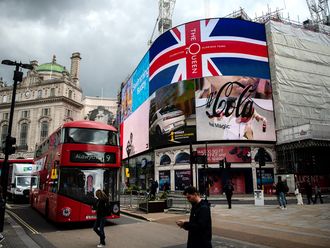London Long-forgotten files carrying secret documents from the waning days of the British Empire were opened to the public yesterday, the first of several releases that promise new insights to an imperial power that stretched from Antigua to Yemen.
The files — whose very existence wasn't known until recently — are the first tranche of material taken from the so-called ‘Migrated Archives', the name given to the 8,800-odd colonial records that were considered too sensitive to leave behind as the empire began to splinter.
Academics, lawyers and journalists are poised to comb through the archive hunting for evidence of British misdeeds — particularly in Kenya, where colonial enforcers executed, tortured and maimed thousands of people during the 1950s crackdown on Mau Mau rebels. Among the tens of thousands of people detained, often in appalling conditions, was President Barack Obama's grandfather, Hussain Onyango Obama.
National Archives records specialist Edward Hampshire said there is good reason to suspect the existence of "juicy material" but cautioned that some of it will be quite routine.
"What this material probably will do is provide a lot of local colour, additional depth," he said. "It will have to wait for the historians to wade their way through it and see what's new and what isn't."
Intelligence reports
Summaries supplied by the archives described the documents in general terms. Much did appear to be trivia: personnel files, registry information, and census data. But filed with them were a wealth of intelligence reports on local conditions, files on anti-colonial leaders, and discussions of rumoured plots.
In Anguilla, a tiny UK dependency in the Caribbean, administrators worried about kidnapping and assassination attempts as the island revolted against domination by neighbouring St Kitts and Nevis. Among the files are military planning documents, intelligence reports on the Caribbean's Black Power movement, and a 1970 document entitled Educational films for psychological operations.
Documents from Malaya (now part of Malaysia) could help illuminate the 1950s fight against communist guerrillas. There are "subversive activity reports", propaganda documents and details of US support for the British counter-insurgency effort.
Many of the documents detail the fight against Kenya's Mau Mau rebels, including details of collective punishments, livestock seizures, resettlement, and lists of people who may need to be put under "control" if they entered the country. The intelligence files on Kenyan rebels include intercepted correspondence relating to Jomo Kenyatta, who would go on to become the country's first president.
Refusals
In the 1960s, the UK refused to hand the files to its former colonies, arguing that they were the property of the British government. Years later, the UK declined to make them public, explaining that they were the records of the former colonial governments.
Historian Piers Brendon — who hasn't seen the documents — said that while much is known about Britain's actions in Kenya and elsewhere in the empire's waning days, the documents could still contain damning new revelations about oppression, torture or abuse.
"They did a terrific whitewash job," he said, referring to senior colonial administrators in Kenya. "I'm not sure that all the whitewash has been stripped away."











